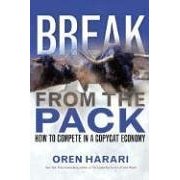
|
http://www.patrickmckenna.com/blog
Page << Prev 80 81 82 83 84 85 86 87 88 89 Next >> of 95
Post #162 - Friday, November 17, 2006
Why Do Good Managers Set Bad Strategies?
 A recent talk (offered as part of Wharton's Distinguished Lecture Series) by Michael Porter (director of Harvard's Institute for Strategy and Competitiveness) -- offered some interesting takeaways: A recent talk (offered as part of Wharton's Distinguished Lecture Series) by Michael Porter (director of Harvard's Institute for Strategy and Competitiveness) -- offered some interesting takeaways:
• Porter stressed that managers get into trouble when they attempt to compete head-on with other firms. No one wins that kind of struggle, he said. Instead, managers need to develop a clear strategy around their firm's unique place in the market.
• Managers who think there is one best firm and one best set of processes set themselves up for destructive competition. "The worst error is to compete with your competition on the same things," Porter said. "That only leads to escalation, which leads to lower prices or higher costs unless the competitor is inept." Firms should strive to be unique, he added. Managers should be asking, "How can you deliver a unique value to meet an important set of needs for an important set of clients?"
• Another mistake managers make is relying on a flawed definition of strategy, said Porter. "'Strategy' is a word that gets used in so many ways with so many meanings that" it can end up being meaningless. Often executives will confuse strategy with aspiration. For example, a firm that proclaims its strategy is to become a leader or to consolidate the industry has not described a strategy, but a goal. "Strategy has to do with what will make you unique," Porter noted. Firms also make the mistake of confusing strategy with an action, such as a merger or outsourcing. "Is that a strategy? No. It doesn't tell what unique position you will occupy."
• One more mistake managers make is confusing operational effectiveness with strategy. Operational effectiveness is, in essence, extending best practices. Good operations can drive performance, Porter said, but added: "The trouble with that is it's hard to sustain. If it's a best practice, everybody will do it, too." Managers often tend to let incremental improvements in operations crowd out the larger strategy of building a unique business that will retain its competitive advantage, Porter noted. To bypass this problem, managers must keep the competitive strategy in mind at all times. "Every day, every meeting, every decision, has to be clear . . . Is this an operational best practice or is this something that's improving on my strategic distinction?"
• The firms with really good strategy almost universally have a very strong CEO, somebody who is not afraid to lead, to make choices, to make decisions." Strategy is challenged every day, and only a strong leader can remain on course when confronted with well-intentioned ideas that would deviate from the firm's strategy. "You need a leader with a lot of confidence, a lot of conviction and a leader who is really good at communication."
Post #161 - Monday, November 13, 2006
When Practice Group Leaders Don’t Perform
I see this happening all too often . . .  there is a job available for a new practice group leader. So, the managing partner looks to the group itself for someone to take on the responsibility. George, the leading luminary and top rainmaker, gets tapped to manage his former colleagues . . . whenever he has the time. Unfortunately George is extraordinarily busy with his own practice and quickly proves to be a pathetic practice group manager . . . largely because managing a busy personal practice and managing a group of other professionals who practice, are two hugely different skill sets. there is a job available for a new practice group leader. So, the managing partner looks to the group itself for someone to take on the responsibility. George, the leading luminary and top rainmaker, gets tapped to manage his former colleagues . . . whenever he has the time. Unfortunately George is extraordinarily busy with his own practice and quickly proves to be a pathetic practice group manager . . . largely because managing a busy personal practice and managing a group of other professionals who practice, are two hugely different skill sets.
Few firms have any history of purging, or disciplining, or counseling those who are not performing as practice leaders. Things have to get pretty unbearable before anyone makes a move. Gentle hints won’t change the situation and neither will stern lectures. And, you can’t incentivize people to do things they are not comfortable doing. A lot of the time, deep down, the partner didn’t really want to take the position in the first place, but didn’t know how to say ‘no.’
And so what do managing partners do with those who are not performing as practice leaders? They work around them. They try to make them some else’s problem. Or, they rationalize the person’s lack of performance by making excuses:
- "there is no guarantee that their replacement will be any better or devote the necessary time to managing the practice group";
- "we can’t be 100 percent sure that it is really them that is at fault; since some of it has to do with not learning these skills in law school and some of it has to do with the firm not valuing management time as much as billable time; and some of it having to do with lawyers resenting anyone trying to manage them; and . . . ";
- "we shouldn’t be too hasty in attempting a change as it could have the potential of risking tremendous embarrassment to the current incumbent"; and
- "after all, the current practice group leader may not be fulfilling expectations or spending any time on actively managing the group, but they’re really not doing that much harm."
To solve this problem, firm leaders obviously need to do a much better job in ensuring that the right partners end up in the right positions, the positions for which they are best suited. But, you all ready know this – hell, one of the most important parts of the job of being a managing partner is picking the right people to serve as practice group leaders. That is why we subject candidates to lengthy interview processes and personality tests, why we put them through extensive leadership training sessions and provide consistent, hands-on counseling. OR, DO WE?
Ahhhhh, maybe that’s the problem!!!
 Here is someplace that you can find a bit of help. Here is someplace that you can find a bit of help.
Posting # 160 - Saturday, November 11, 2006
Redefining Expectations
Nice commentary from Elizabeth Ellis (on the Slaw cooperative weblog) who attended at my KeyNote Presentation earlier this week . . .
I was fortunate to attend this week's CBA conference "Leading the Canadian Law Firm in the 21st Century: Managing the Future". Key topics included the talent pool, managing risk, and managing conflicts. While the materials and discussions on these topics all merit further comment here, probably the sessions that were most discussed (aside from the Monday night live music and dance extravaganza which featured an incredible array of Maritime talent) were two sessions that addressed client service. While both sessions were addressed at lawyers dealing with their clients, the strategies discussed are clearly relevant to all service areas in the firm, including the library. Patrick McKenna's keynote address contained a real life (non-law firm) illustration on how to "redefine" client expectations that can be readily adapted by any service provider.
Thanks Elizabeth!
Post #159 - Saturday, November 11, 2006
Test For Smart People
 The following short quiz consists of 4 questions and will tell you whether you are qualified to be a professional. The correct answer appears just below each question – but DON”T peek. The questions are NOT that difficult. Don't look UNTIL you have answered the question! The following short quiz consists of 4 questions and will tell you whether you are qualified to be a professional. The correct answer appears just below each question – but DON”T peek. The questions are NOT that difficult. Don't look UNTIL you have answered the question!
Question #1: How do you put a giraffe into a refrigerator?
The correct answer is: Open the refrigerator, put in the giraffe, and close the door.
This question tests whether you tend to do simple things in an overly complicated way.
Question #2: How do you put an elephant into a refrigerator?
Did you say, Open the refrigerator, put in the elephant, and close the refrigerator?
Wrong Answer.
Correct Answer: Open the refrigerator, take out the giraffe, put in the elephant and close the door.
This tests your ability to think through the repercussions of your previous actions.
Question #3: The Lion King is hosting an animal conference. All the animals attend .... except one. Which animal does not attend?
Correct Answer: The Elephant. The elephant is in the refrigerator. You just put him in there.
This tests your memory.
Okay, even if you did not answer the first three questions correctly, you still have one more chance to show your true abilities.
Question #4: There is a river you must cross but it is used by crocodiles, and you do not have a boat. How do you manage it?
Correct Answer: You jump into the river and swim across. Have you not been listening? All the crocodiles are attending the Animal Meeting.
This tests whether you learn quickly from your mistakes.
According to Anderson Consulting Worldwide, around 90% of the professionals they tested got all questions wrong, but many preschoolers got several correct answers. Anderson Consulting says this conclusively disproves the theory that most professionals have the brains of a four-year-old.
Post #158 - Tuesday, November 7, 2006
What Is Your Succession Strategy?
Do you know that today, every seven seconds, someone is turning sixty? Indeed, it is expected that 40% of lawyers will be retiring soon, leaving not a hole in many law firms, but a sizable cavity!
It is very likely that someone important to your firm’s future is getting closer to retirement. When that professional leaves, so too will valuable knowledge and key access to many of your firm’s most valuable clients. Do you know that there is a competitive firm out there right now that is targeting the clients of your soon-to-retire partners? They are gambling that you will not get your succession matters in order and that client will soon be up for grabs.
There is also a concurrent gap in leadership being created as baby boomers retire . . . but we ignore all these warning signs until it is too late. Is your firm ready? Ask yourselves these questions:
• How many of our partners will be retiring over the next 10 years?
• What is the impact to our firm if we lose the knowledge those individuals possess?
• What is the impact to our firm if we lose the client contacts those individuals enjoy?
• What specific action plan do we have in place to ensure the next generation of leaders are in the pipeline?
Your current state of busyness can distract you to the point that, the next time you look up, it may be far too late to act. Develop your succession plan now!
Post #157 - Tuesday, October 31, 2006
Watts Happening?
 Every so often I get a little note from futurist, author and fellow provocateur, Watts Wacker updating me on a few of the latest trends and developments. If you are not familiar with his work, you owe it to yourself to have a look. Every so often I get a little note from futurist, author and fellow provocateur, Watts Wacker updating me on a few of the latest trends and developments. If you are not familiar with his work, you owe it to yourself to have a look.
* Seen the new Nieman Marcus Christmas catalogue? ... a barometer of the wealthy. The signature "gift" for this year is a $1.76 million space charter for six. This is their 80th edition.
* Chicago is booming. I counted 52 (!!) cranes building new downtown skyscrapers. Real estate transactions are humming too. Chicago has had over 15 million square feet of space sold this year. Note too ... Chicago's price/sq. ft. is $209 ... New York (mid-town) is $635 ... Washington DC, $409 ... Boston, $406 and San Francisco, $352.
* A full 40% of those already retired fear that they will run out of money (Society of Actuaries). Two thirds of those same people underestimated the life expectancy of people their own age.
* What happens when informatics ... cognitive science ... genomics ... neurobiology ... genetics and behavioral medicine all are combined? I don't know yet but we're watching.
* A crisis may be brewing in the future of the auditing profession. The litigation liability facing the "big 4" may be insurmountable. A special capital markets commission formed by the U.S. Chamber of commerce is trying to figure it all out.
* Photonics are here! A silicon chip that can produce laser beams no longer needs wires to send data between chips. Look for commercialization before '09.
* Vital Camel Milk is creating a dromedary dairy industry. A third world niche moving toward first world. The U.N. predicts a $16 billion industry by 2016. We'll see.
* Germany has the lowest birthrate in Europe for three decades running. Germany's population may actually start shrinking ... at a very bad time. The U.S.A.'s birthrate is 2.1 which is the necessary rate to sustain a population. Germany's rate is 1.3.
* There are currently 400 nuclear reactors in 31 different countries. They provide 16% of the world's electricity. China plans to add 32 to the list by 2020.
* Have you heard of a sling box? This is the device that streams live TV shows onto your computer ... no matter where you are. Version 2.0 of the device is out (many options from numerous suppliers) for about $200. Time to get yours.
Post #156 - Friday, October 13, 2006
Leading The Canadian Law Firm
 I’m looking forward to visiting with a few old friends next month at the annual Canadian Bar Association Conference, entitled Leading the Canadian Law Firm in the 21st Century: Managing the Future. I’m looking forward to visiting with a few old friends next month at the annual Canadian Bar Association Conference, entitled Leading the Canadian Law Firm in the 21st Century: Managing the Future.
Yours truly will be delivering the keynote address on November 6th.
Further details can be obtained by downloading this PDF copy of the program.
Post #155 - Friday, October 13, 2006
Beware The Green-Eyed Monster
One of the more insidious and de-motivating behaviors that can invade any partnership, firm or practice group is envy and professional jealousy. And when envy strikes, productive relationships are difficult to maintain.
According to research conducted by Professor Robert Vecchio, 77 percent of those surveyed claimed to have witnessed some act of professional jealousy around their office during the past month. Even more alarming, more than half of the same group surveyed, admitted to being directly involved themselves.
In you’re interested, the following questions (modified from those originally designed by organizational analyst J. Gerald Suarez) should assist you in conducting a self-assessment:
- Do you find that you are often critical of those partners more successful than you?
- Do you feel discomfort in congratulating some other partner on a recent achievement?
- Are you resentful when some partner lands a significant new client engagement?
- Are you offended by those partners who do not view you as a source of assistance?
- Do you try to mask or hide your feelings of envy from yourself?
According to Vecchio, professional envy is based on internal competitiveness as in “how do I stand against my fellow partner?” and those afflicted with envy usually also suffer from extremely low self-esteem. In most cases, envy is about the fear of losing social standing – your sense of value is being threatened.
Post #154 - Thursday, October 5, 2006
Know Your Client’s Lingo
Every industry utilizes words and phrases that might be foreign to those outside that particular industry. These excretions are known variously as terms of art, lingo, buzzwords, jargon and that old standby, gobbledygook. When clients chat with professionals who’ve got their jargon down, communication isn’t a problem and an otherwise strange word or phrase may serve as a serviceable shortcut. With that in mind, the following is a collection of terms that could mean different things to different people but are in general use among members of the financial, investment and technology fraternities. Use them at your peril:
Carry - A percentage of the profits the firm makes. Carry is the Holy Grail of venture capital. Typically, the general partners receive a combined 20 percent of the profit from investing. For instance, if a firm receives $100 million in capital for its fund, and over 10 years returns $400 million, the profit was $300 million. The investors, or limited partners, receive 80 percent, or $240 million, and the general partners split 20 percent, or $60 million among themselves.
IRR - Internal Rate of Return. This is a calculation that determines what the rate of return is on a portfolio investment or on the total venture fund. One way to think about it is, if you put your money in a bank account that gives you 5.5 percent interest annually, you could say your IRR on that investment would be roughly 5.5 percent (not accounting for taxes or service fees). IRR is the most important measure of performance for a VC fund.
DTB - Drop the bomb - to resign at the worst possible time.
KSA - Knowledge, Skills and Abilities. Instead of writing chronological resumes, many seasoned workers are concentrating on these three key terms.
Low-hanging Fruit - The market that is presumably the easiest to secure for your services. Getting a bit shopworn.
Twitch Speed - A term used to describe how young people absorb and use information. (refers to how fast your thumbs move when you're playing a video game). Marc Prensky, a VP at Bankers Trust, developed "twitch-speed" training games designed to keep young hires interested during training courses.
Long Tail - The theory of the Long Tail is that our culture and economy is increasingly shifting away from a focus on a relatively small number of "hits" (mainstream products and markets) at the head of the demand curve and toward a huge number of niches in the tail. As the costs of production and distribution fall, especially online, there is now less need to lump products and consumers into one-size-fits-all containers. In an era without the constraints of physical shelf space and other bottlenecks of distribution, narrowly targeted goods and services can be as economically attractive as mainstream fare.
Post # 153 - Thursday, September 28, 2006
Break From the Pack: How to Compete in a Copycat Economy
 Oren Harari chose a great title for his latest book and then delivered a fabulous tome. Oren Harari chose a great title for his latest book and then delivered a fabulous tome.
Everywhere, products are being commoditized, services are being imitated, and traditional barriers to market entry are collapsing. To sustain competitive advantage in today's Copycat Economy, companies must break from the pack. Oren starts by touring "Commodity Hell," and identifying 10 common mistakes that keep companies trapped in the pack.
Next, Harari introduces six strategies for propelling your organization where competitors can't follow. Learn how to dominate markets (and when to leave them); how to create a "higher cause" that will mobilize stakeholders; and how to build a pipeline of cool, compelling products, in any industry. Harari reveals new ways to take customers far beyond mere "satisfaction," and shows how to innovate in even the most prosaic areas of a business. Harari offers a candid "12 Step" program for transforming leadership behavior to lead the charge -- and leave competitors in the dust. This is a great read!
What I found most interesting is how closely his text reflects the content of a one-day seminar that I, together with my good friend Professor Dennis Sherwood, will be delivering in London for MBL Seminars entitled Standing Out From the Crowd: Differentiation Strategies For Law Firms to Improve Bottom-Line Performance. It is scheduled for Tuesday, 24 October. Check it out.
Page << Prev 80 81 82 83 84 85 86 87 88 89 Next >> of 95
|
|


 Ashridge House
Ashridge House  11226 - 60 Street
11226 - 60 Street  Edmonton, Canada
Edmonton, Canada  T5W 3Y8
T5W 3Y8